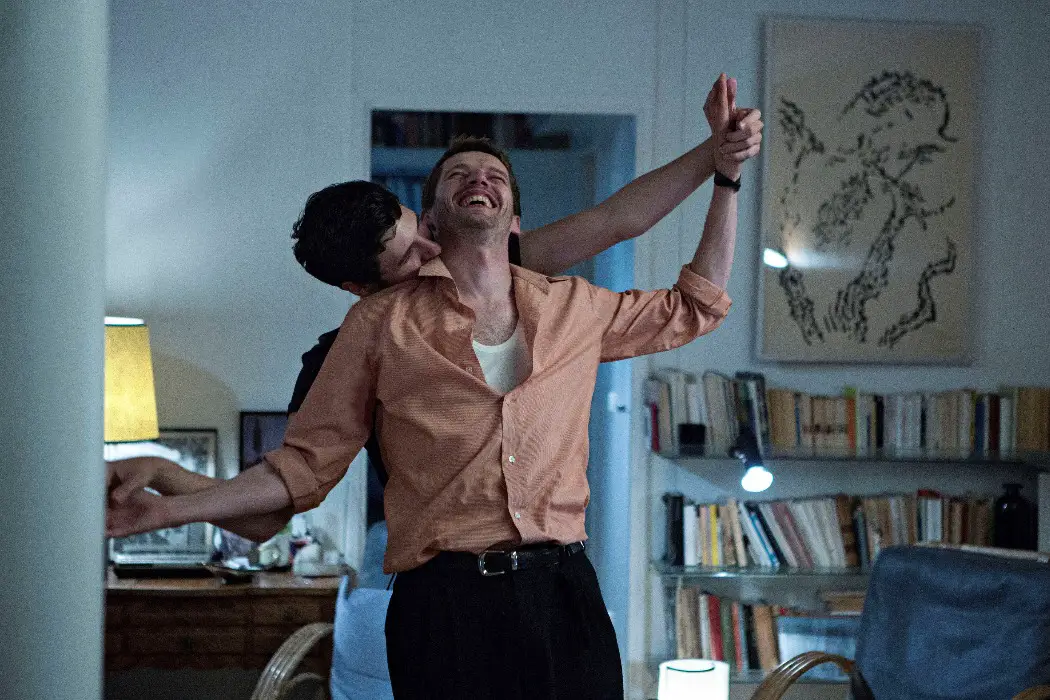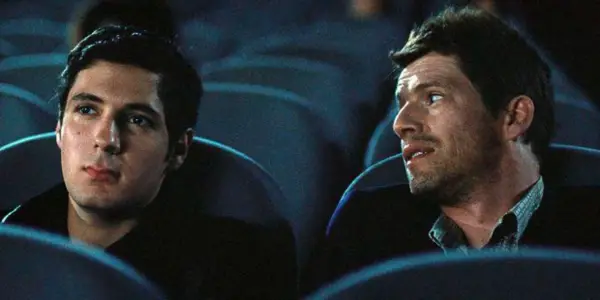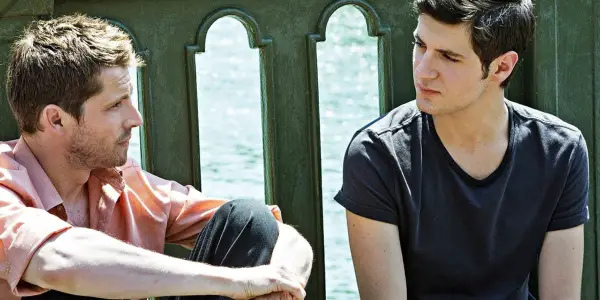SORRY ANGEL: A Powerful Look At Love Amidst Tragedy

Alistair is a 25 year old writer based in Cambridge.…
LGBTQ period pieces are synonymous with the trauma faced by older generations of queer people, and their societal anxieties, which are still felt by many in the community in supposedly welcoming times. It’s near impossible to tell a story rooted in the past about a LGBTQ character without circling back to the laws designed to persecute them, the deterioration of their family unit, or the omnipresent spectre of the AIDS crisis – such a staple of these period pieces, there are now numerous films where it doesn’t even need to be mentioned by name to be acknowledged.
A Deceptively Complex Character Study
Christophe Honoré‘s latest film Sorry Angel, which premiered in the Cannes competition back in 2018, is firmly rooted within an early 90’s milieu, but grapples with questions that are as relevant now as they were back then. We may not have an existential threat as significant as the AIDS crisis hanging over our heads, but in a society where homophobia is still rife, is it permissible to ignore the struggles of many in our community in the hope of maintaining a sense of personal happiness? Are we allowed to overlook the problems many of us still face in the same manner a straight person could, conforming to their concept of normality in order to have a carefree life?
These questions are given an added existential focus when transplanted into the life of a man diagnosed with AIDS before a cure had been found, choosing instead to spend his final months grasping for personal contentment over becoming an activist or martyr in the name of raising awareness. It’s a deceptively complex character study, which succeeds in exploring its subject from a specific human angle often overlooked in order to portray only the most tragic cases.

Pierre Deladonchamps (well known for that other recent high watermark of French LGBTQ cinema, Stranger By the Lake) stars as Jacques, a thirty something author who seemingly has everything he could want; a successful literary career, a healthy son, and a string of lovers who orbit his life at will. But he’s mostly trying to avoid confronting the inevitable – his diagnosis with the AIDS virus, which is already causing the rapid deterioration of the health of his ex Marco (Thomas Gonzalez). Around the same time, he meets 22-year-old Arthur (Vincent Lacoste), a camp counsellor from Brittany who he sees in the audience at a screening of The Piano. He’s open about his diagnosis with Arthur, but the pair remain smitten with each other, even as they quickly realise that any blossoming love between the two can only end in tragedy.
The comparison is inevitable, but it isn’t lazy to suggest that Sorry Angel is in many ways the opposite side of the coin to BPM, Robin Campillo‘s award winning drama about Parisian Act-Up activists. Over the course of its running time, that sprawling ensemble piece narrowed its focus to a similarly tragic relationship between two members of the organisation, their affection for each other only strengthening following the diagnosis. But those characters aimed to spend their final days fighting, even demanding that their ashes be thrown at politicians who refused to help their cause.
The characters in Sorry Angel are far more content spending their remaining days securing happiness, before the virus takes hold. At one point, Pierre even expresses sheer bafflement as how his lover can attend an Act-Up meeting in Paris, chasing the naive notion that he could make a change, when the government has shown only indifference to the many deaths in the wake of the outbreak.
Joy and Tragedy Go Hand in Hand
But like BPM, the film similarly doesn’t want to be confined by tragedy in its depiction of lives affected by the deadly virus. There’s something genuinely subversive, at least in comparison with the majority of other films on the same topic, about depicting a character with a positive AIDS diagnosis as having a fulfilling romantic life and an exciting sex life, not letting the ticking clock above his head burden his final days.
Deladonchamps is effective as Pierre, straining to hide his emotions, even if it means hiding in a friend’s flat so his new partner can’t see him take a sudden turn for the worse. His few sequences with Gonzalez as his ex boyfriend Marco are powerful in their frankness; the pair share a bath together, Marco’s body struggling to get into the tub due to his frail state, the physical pain clearly expressed even as the dialogue tiptoes around the edges of confronting the full implications of its bleakness head on.

Lacoste‘s performance isn’t as heavy hitting, but it does feel similarly lived in, with every casual conversation suggesting a rich life beyond the frame. There’s little adversity within his life, with his biggest struggle being his disenfranchisement with his peers, who don’t share the same passions as him, be they literature, or the sheer life affirming joy that only good sex can bring. His circle isn’t particularly homophobic or judgmental (his ex girlfriend is fairly blasé when they discuss how he slept with men while they were dating), but they don’t chase the same things in life as him.
Age gap romances are almost always problematic onscreen, but here, the generational difference between the two romantic leads is firmly grounded largely because of this (there’s no confusion as to why Arthur would fall for an older man under his circumstances), feeling truthful where any other director would play into harmful stereotypes. Both parties understand the ramifications of the relationship, and the film doesn’t avoid this in the way Pierre would so desperately prefer to.
Sorry Angel: Conclusion
Sorry Angel may be set in the same year that Philadelphia brought the discussion of the AIDS crisis firmly into the mainstream, but it has taken an additional 26 years for cinema to acknowledge the lives of people diagnosed with the condition with a complexity beyond mere tragedy. AIDS was a death sentence, but Honoré understands that this doesn’t necessarily mean it needs to be assessed in simple, misrerabilist terms.
People who died of AIDS were reduced to being viewed as mere victims of the disease, overshadowing the richness of their lives – Sorry Angel is tragic because, by focusing predominantly on that richness, the sadness becomes all the more affecting.
Sorry Angel was released in the UK on March 22, 2019. All International release dates are here.
Does content like this matter to you?
Become a Member and support film journalism. Unlock access to all of Film Inquiry`s great articles. Join a community of like-minded readers who are passionate about cinema - get access to our private members Network, give back to independent filmmakers, and more.
Alistair is a 25 year old writer based in Cambridge. He has been writing about film since the start of 2014, and in addition to Film Inquiry, regularly contributes to Gay Essential and The Digital Fix, with additional bylines in Film Stories, the BFI and Vague Visages. Because of his work for Film Inquiry, he is a recognised member of GALECA, the Gay & Lesbian Entertainment Critics' Association.













